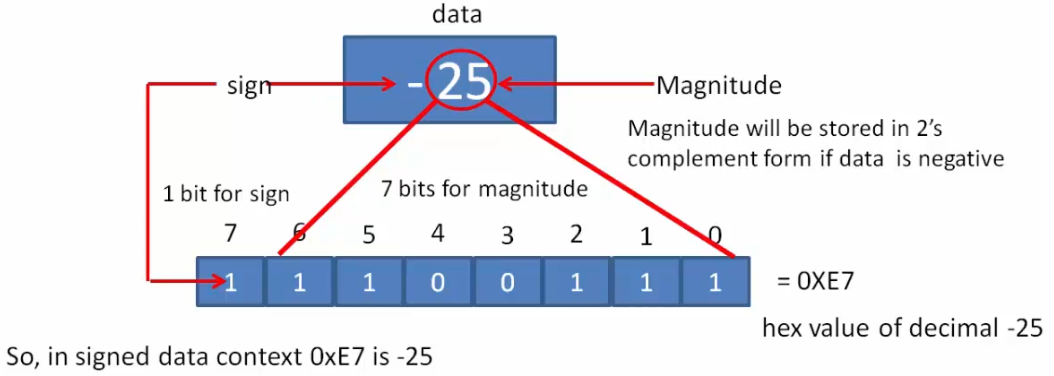Home | Projects | Notes > C Programming > Data Types & Variables
Data Types & Variables
Data Types
Data type is used for declaring the type of a variable.
In C programming language, data types determine the type and size of data associated with the variables.
Before a variable can store any value, its type must first be defined.
Representing real-world data:
Data as numbers (e.g., integers, real numbers)
Data as characters
Data as strings (i.e., collection of characters)
Some Important C Data Types
Integer Data types
Used to represent whole numbers (i.e., integers)
e.g., 10, 20, 30, etc.
Integer data types (signed):
charshort int- also used asshort(intis implied)intlong int- also used aslong(intis implied)long long int- also used aslong long(intis implied)
Integer data types (unsigned)
unsigned charunsigned short intunsigned intunsigned long intunsigned long long int
Float Data Types
Used to represent real numbers
e.g., 10, 24.5, 60.00001, etc.
Storage Size of Data Types
The C standard does NOT decide the storage sizes of data types. It's the compiler (or compiler designer) who decides it!
The compiler (e.g., GCC) will generate the code to allocate certain size of memory for each variable of certain data type.
Do not assume the size of data types! Make sure to check the documentation when in doubt!
What the C standard specifies are the minimum and maximum values.
e.g., The C standard specifies the storage size of a
longtype variable as 32-bit, and the maximum as 64-bit. So, the exact size of thelongtype can be decided by the compiler within this range.Some compilers fix 32-bit storage size for
longtype variables, while others may do 64-bit.Some compilers fix 16-bit storage size for
longtype variables, while others may do 16-bit.The following data types will always be of FIXED-SIZE irrespective of compilers.
short(signed or unsigned) - 2 byteschar(signed or unsigned) - 1 bytelong long(signed or unsigned) - 8 bytes
Integer Data Type
char, unsigned char
charThis is an integer data type to store a single character (ASCII code) value or 1 byte of signed integer value (positive or negative).
A
chardata type variable consumes 1 byte of memory.charhappens to be the smallest integer data type of 1 byte.There is no other special meaning for the
chardata type, and it is just one of many integer data types.Range: [-128, 127]
Negative (sign bit = 1) - 2's complement representation
Minimum value: 1|0000000 (= -128)
Maximum value: 1|1111111 (= -1)
Positive (sign bit = 0)
Minimum value: 0|0000000 (= 0)
Maximum value: 0|1111111 (= 127)
unsigned charThe
unsigned chardata type is used to store 1 byte of unsigned data."Sign bit" is not necessary.
Range: [0, 255]
short int, unsigned short int
short int(short)Stores 2 bytes of signed data. (Always, not compiler dependent!)
Range: [-32768, 32767]
unsigned short int(unsigned short)Stores 2 bytes of unsigned data. (Always, not compiler dependent!)
"Sign bit" is not necessary.
Range: [-0, 65535]
int, unsigned int
int,unsigned intstore signed/unsigned integer data.Consumes 2 or 4 bytes of memory depending on the compiler. (Check the compiler manual.)
long int, unsigned long int
long int(orlong),unsigned long intor (unsigned long) store signed/unsigned integer data.Consumes 4 or 8 bytes of memory depending on the compiler. (Check the compiler manual.)
Variable Definition
Variable definition always includes data type followed by variable name.
xxxxxxxxxx11unsigned char dicyXTemperature;Variable definition must proceed the variable usage.
Programmers are to select appropriate data types according to the needs of the project.
Representing Negative Values (2's Complements)
Represent the data -25 in 1 byte signed data representation
2's complement = 1's complement (flip all bits) + 1
